East-West Idealists

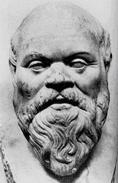 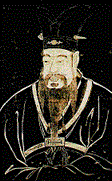 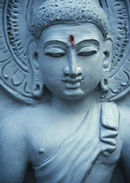
“The thought that I have not properly cultivated virtue,
that what is learned has not been thoroughly discussed,
that knowing what is right I have not moved toward it,
that what is wrong I have not been able to change -
these are the things which bother me”

- Confucius
We saw in previous lessons how philosophy and science were reborn in what scholars call "The Amazing 6th Century BCE" or "The Time of Teachers". A flow of science and learning began with Thales around 585 BCE and continued through Pythagoras (c, 525 BCE) and many Greeks after that. In China, we saw a similar rise of reason, science and math--even the Pythagorean Theorem was independently realized in the Chou Pei of the 6th Century. And India was ahead of both China and Greece by some decades, covered in the lesson before.

Now all this new thinking led to another stage of development in China, India and the West. The horror of the chaos and killing of the warring Greek, Indian and Chinese states now confronted the new scientific and skeptical philosophy, triggering an extraordinary response on the part of three people. Philosopher-Teachers in each of those regions gathered several hundred students around them, and taught them a far more sophisticated worldview than the myjology they had been taught as children. These students in turn went out and transformed their societies with the new learning. It was the most significant event in each of theses cultures and it happened with an astonishing synchronicity, as acknowledged by writers and historians such as Karl Jaspers, Joseph Needham and Arnold Toynbee.

Where would we be without Idealism? No doubt in a far more materialistic mindset--a world even more inclined to kill, conquer and destroy. If historians were asked to single out one person as the most significant philosophical figure in the West, most would give the title to the Idealistic philosopher Socrates. Faced with the chaos and bloodshed of his day, Socrates sought to bring an end to it, inspiring a school of thought that became the intellectual backbone of society--a philosophy which changed Greece to its core. It is liberating to see how one single individual could make such an enormous impact on the world.

While a young man, Plato tells us that Socrates met with Parmenides, Protagoras, Gorgias and other philosophers. After listening to the skeptic Zeno, who came to Athens in 450, Socrates used skepticism as a starting-point for all his thought and logic. This led him to the well-known Socratic Method, the asking of question after question until no answer remains. He began teaching at the Acropolis, causing a sensation when he refused to charge for his talks, entertaining for free all who would listen. As word of his wit and brilliance spread, students started to accumulate and his audiences grew larger. They were soon hanging on every utterance.

Xenophon pictured Socrates as "so just that he wronged no man in the most trifling affair...so temperate he never preferred pleasure to virtue; so wise he never erred in distinguishing better from worse." Plato hailed him as "truly the wisest, and justest, and best of all men whom I have ever known."

Socrates fascinated the Athens scene as the philosopher who admitted he knew nothing. He revealed that there were no real answers--there were only questions. Famous for asking "What is it?" until no answer was possible, he facetiously declared that even after he dies and goes to Hades he would continue his inquiries, finding out who among the dead philosophers "is wise--and who pretends to be wise and is not." Where Parmenides declared "That which is, is", Socrates wanted to know exactly what that "is" really was.

When the oracle at Delphi was asked "Is any man wiser than Socrates?", she replied "No one." This proclamation no doubt pleased Socrates to no end and increased his audience even more. His questions ran the gamut. What was justice, what defined insanity, who was courageous--who should govern? He was trying to make his fellow Greeks think about the world they had created for themselves and what to do with it. Those who did not consider such things, those who were ignorant, he explained, could rightly be seen as slaves to false notions.

All of his questioning, especially about good government, eventually earned him the death penalty and, in 399 BCE, Socrates was condemned to drink poison for his teachings. After downing the hemlock, he gathered his students and friends around him--and conducted a final talk while waiting for death to overtake him. Such a dramatic end to his life helped assure his fame, and meanwhile showed the Western world that a principle was worth dying for. It is believed, moreover, that he could have avoided his death sentence but preferred it, knowing it would make him “immortal.” This last teaching of Socrates inspired the writing of The Dialogues by Plato--a book that forever changed the West by becoming the starting-point for thought and education.

The eastern counterpart to Socrates is obvious, even though so many teachers and thinkers were alive at this time in China. If scholars had to select one thinker above all others in Chinese history, most would choose Confucius--who died only 8 years before Socrates was born--and who inspired the Idealist philosophy that became the educational backbone of China. Confucius and Socrates are accepted as the most important philosophers in their respective cultures and yet they lived so close in time to one another. They both accomplished the Herculean task of transforming their cultures nearly single-handed.

We know Confucius and Socrates shared a desire to end the intellectual and political chaos surrounding them, to bring order. Each one wanted to find a new morality which required no gods, an idealism that would change the way men thought. Both sages succeeded in their ultimate common goal.

Confucius had wandered from town to town, surrounded by hundreds of students. Eight years after he died in 478 BCE, Socrates was born. Socrates started his Idealist school in the public places of Athens, his oratory gathering larger and larger crowds. Like Confucius, he avoided talking about natural law and all the theories afloat at the time. Socrates mostly spoke of human affairs, of ideas. Trying to figure out how Nature operated was mere speculation and was avoided.

Confucius was primarily interested in the same matters as Socrates--in human affairs. What made a good man? A good ruler? A good government? Naturally, the chaos of the warring states East and West inspired these types of questions. Socrates and Confucius were seeking to temper their respective worlds with philosophy and ideas of reform. Their criticism, however, created enemies among the elite and powerful. Confucius found it convenient to keep moving while Socrates did not--and so he suffered.

We are indebted to Socrates and Confucius. It is hard to value their transformational contributions to the awakening process known as human history. Within 250 years, the philosophies of the twin Idealists would be employed to teach the young of the Han and Roman Empires, which in turn established their thought for millennia. They continue their underlying influence to this day. Imagine the additional chaos and bloodshed if these two had not lived.

India, too, has a thought-provoking parallel, another Idealist who helped bring an end to the mindless slaughter of the 6th and 5th Centuries BCE: the Buddha. As with Socrates and Confucius, Buddha gave Thought more authority than Matter, an Idealism that led him to a similar end. Inside every man was an inner goodness. Right conduct can nurture that inner goodness and, if one works hard enough on aligning the inner self with the Spiritual Force of the Universe, enlightenment and even Nirvana are possible.

The difference between Good and Bad, Compassion and Greed were all clearly delineated to help transform the typical mania for power and wealth into some sort of balance with the world. The similarities of these thinkers are many and significant. Each of their systems of thought became the spiritual/intellectual foundation of huge empires that were to soon appear. And all of them inspired many students who went out into the world and tried changing it for the better. Between the three, Buddha, Socrates and Confucius, we see how powerful a synchronistic pulse can be.

Buddhism helped impart a religious but non-mythical idealism to Indian society--at the same time the Jainism of Mahavira spread the belief of ahimsa, or non-violence toward all, including animals. These concepts became major elements of Indian life, forever giving it an intense spiritual conscience.

The Buddha was originally a prince named Siddhartha Gautama. Like Heracleitus and Lao-tzu, he gave up his comfortable life to go off and contemplate the universe as an ascetic. He found, however, that the severe ascetic lifestyle disturbed him and one day, while sitting underneath a pipal tree, he found his path to enlightenment. Asceticism was not the answer to the cessation of suffering—right behavior and correct meditation was the way. Gautama had become the Buddha.

Having reached "Nirvana", Buddha realized that this would be his final reincarnation on Earth. He told his followers: “The emancipation of my mind cannot be lost; this is my last birth; hence I shall not be born again!” That Nirvana could be the end result of many reincarnations became a concept that fascinated the sub-continent for millennia. Like Confucius and Socrates, Buddha shaped the subsequent flow of his whole society, he replaced myth with a new Idealist structure: live a righteous life and you will be rewarded in the next one.

The question arises: was Buddhism philosophy or religion? This has often been debated, with the same question being raised of Confucianism, which became a state ancestor religion and the metaphysics of Socrates and his students, who helped give the West--and Christianity--the concepts of God, Heaven, Hell and Purgatory.

Socrates was followed by Plato, who offered a simple description of Idealism in The Cave. He compared human perception to people chained in a cave, positioned so they only see shadows on the wall. This appearance, the shadows of things, is what they believe to be reality. The actual light from the Sun, the real Reality, is never even seen--it is outside, beyond the mouth of the Cave. So we can only know the shadows on the wall, or our ideas about reality—we never directly know reality itself. This is somewhat similar to the Buddhist explanation of the material world: maya, or illusion.

The world is indebted to Plato for having written the Dialogues--his memory of the talks Socrates had with the other philosophers of Athens--as so many concepts came from that book. His idea of cultivating the good within each student, of developing their full intellectual potential, directly inspired subsequent Western learning. He laid down the basic concepts of what a well-rounded education entails, something that became the norm in Roman times.

His picture of the ideal state, painted in The Republic, enlightened later leaders and scholars for millennia, even though none ever reached Utopia. Yet Plato was not all rational philosophy. He believed in God, in Heaven, Purgatory and Hell. These concepts, which ruled theology for over two millennia, actually have their roots in The Republic. In short, we owe Plato much for his numerous and significant contributions, although many would say we could have done quite well without the ideas of Purgatory and Hell.

Plato lived a long life, much beloved by his students and friends. The success of his earlier students had made him famous yet he still wandered about the Academy offering research projects to eager disciples, and giving them guidance on many matters. One day, when he was 80, Plato was invited to a wedding of one of his young students. Growing tired of the festivities, in the evening Plato sat down and soon fell asleep. He never woke up. The entire city of Athens came out to memorialize him.

Plato’s contributions to the evolution of thought are enormous. He wrote the Dialogues and put the Idealism of Socrates on a pedestal for all to see, making it the intellectual foundation of The Academy. He set the standard for schooling and, in the end, changed all of Western society. Yet here again there is a Chinese twin to match even the great Plato, the second most important figure in philosophy.

While Plato (427 - 347 BCE) was elevating Socrates to the pinnacle of Western thought, a Chinese scholar named Meng-tzu--also known as Mencius (371 - 289 BCE)--was doing the same for Confucius. Meng-tzu was even called “The Second Sage” throughout all of Chinese history, just as Plato was called “The Second Philosopher.” Like the Greek, he turned an idealist teacher, in his case Confucius, into an immortal character, recreating stories and conversations to explore idealist philosophy in The Analects--at the same time Plato was immortalizing Socrates in The Dialogues.

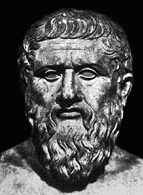 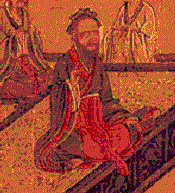

Plato Mencius

They both wrote books about the ideal state, although in The Republic, Plato saw the king on top of the hierarchy, with the people on the bottom. Meng-tzu reversed the order. Each man felt strongly about their Idealism and their desire to change the world. Their concepts on Utopia were referred to for the next two millennia.

Neither Meng Tzu nor Plato, however, were content with merely writing or speaking about the ideal state. Meng Tzu would ride with flowing robes at the head of dozens of chariots and hundreds of disciples into the capitol of a kingdom. The ruler and his court were then lectured on the mistakes they were making, on how they must become wise sage-kings to truly follow the Will of Heaven. After a series of harangues, which the monarch always listened to politely, Meng-tzu would leave. Although the tyrant immediately returned to his nefarious ways as soon as he was gone, Confucianism in this way was broadcast to all of China. This type of traveling philosophical road show was a tradition in China.

This is similar to 387 BCE, when Plato was invited by King Dionysius of Syracuse (in Sicily) to come and establish the ideal state in his land. The philosopher agreed and traveled to the distant kingdom. Once the ruler found out, however, that he would have to become either a philosopher or step down as king, the deal was off and a great argument ensued. Dionysius became so angry he had Plato sold into slavery, from which he was fortunately soon liberated by his pupil Anniceris.

Another interesting correspondence is what the two accomplished in the field of education. Plato taught at The Academy, while Meng-tzu taught at a similar Chinese academy, the Chi-hsia, several thousand miles away. Both set the standard for learning for years to come. While Plato taught that education and self-knowledge could bring out the good in every man and prepare them as leaders and philosopher-kings, Meng-tzu advocated the cultivation of the "Great Morale", which rests within the heart of all human beings.

The Great Morale is an inner constant, our "original nature"--in tune with the Will of Heaven. Righteousness is the outward expression of the Will of Heaven. By nurturing this inner constant through the correct education, right conduct will be a natural result and the world will eventually reform and align with Heaven. Although the vocabulary changes, Plato was no different in his basic outlook. Meng-tzu taught:
"If one constantly practices righteousness, the Great Morale will naturally emerge from the center of one's being...the sage, in his original nature, is similar to everyone else. Hence every man can become a sage, if only he gives full development to his original nature"

This is essentially Meng-tzu's theory of education, to bring out the sage-like inner nature of the student. The similarities between these two giants of the past are remarkable. Without the work of Plato and Meng-tzu, it is uncertain what might have eventually happened to the efforts of Socrates and Confucius.

Socrates and Confucius were thus followed by students who wrote down their oral teachings after they died, creating a classic work that became the core of education for both China and the West. Buddha nurtured a similar disciple. Buddhist tradition has always spoken of Kasyapa who, shortly after the Buddha's death, presided over a council of disciples which orally assembled into verse all the teachings they could gather. Later, in the 4th or early 3rd Century BCE, these verses were written down in a series of texts: the Pali Canon. Like the Dialogues or The Analects, the Pali Canon became the source of quotes that spiritual and philosophical leaders would use to make their points and enlighten their listeners.

One of the texts, the Dhammapada, became a classic every monk would memorize. As with The Dialogues or The Analects, it became the core text for education in the later empires. And the Dhammapada reveals, as does Plato's idealism, that Thought rather than Matter was the primary motive power in the universe. Similarly, within the heart of every person was an inner goodness, a sage-like nature that must be cultivated in order to avoid the natural impulses toward greed and avarice. Here again we see a logical philosophy designed to temper and offset the murderous tendencies of the new ego-driven materialism. As in China and the West, cultivating that inner self became the general goal of education.

At the same time, the Jain and Hindu religions in India also demythologized their beliefs--even employing logic in their arguments. They, too, tempered greed at the same time as the Buddhists--with writings that record the teachings of Mahavira and the many Hindu Masters of the late 6th and early 5th Centuries BCE. As with Buddhism, which no doubt drew much from Jainism and the Upanishads, meditation was the way to enlightenment.

The correspondence in thought is clear between East and West, although the Indian varieties were a couple of shades more religious.

Nevertheless, Plato talked of God as the original idea of the universe, and Mencius believed in the Will of Heaven, with both saying that attaining a pure inner self was the way to know God or be in tune with the Will of Heaven. How different is that from Buddha's system of spiritual levels leading up to Nirvana?

What caused this wholeness between these widely flung cultures? There are no real answers, only hypotheses. Some historians might argue, for example, that the concept of empire traveled from West to East, a case of direct contact. Yet even if contact was direct, how can we explain empire's acceptance among the population for centuries or the synchronistic timing of it all? And how can transmission play a part in the popularity of independently invented philosophies, created over millennia in entirely different languages and scripts between cultures that had little or no contact with each other? We know that the population of both East and West roughly paralleled each other until 1000 CE and that climactic change might help explain some shared trends but on the whole there are more questions than answers.

Discussion: What were the similarities between the idealist philosophies of Socrates, Buddha and Confucius? What did they hope to change about the world?

Essay: How were Meng-tzu and Plato similar? How were they different?

Essay: Who was Kasyapa and what did he do?

Essay: Do you see any similarities between this paradigm shift, from mythology to Laws of Nature, in any other time period? If so, what are the similar changes involved?

Timeline: Enter East-West Idealists and list the critical people or events studied on your Timeline. Put notes in your notebook. |

Links: Idealist Links
| | Journal Discussion Group
|
The Synoptic Meaning
of The East-West Idealists

Idealists in East and West--and in between--transform each of their societies with new belief-systems based on improving the world. This era, between 500 and 350 BCE, begins the zenith of Classic Greece, India and China--setting these major cultures off in a new direction for the next 2000 years. Idealism believes human beings are essentially good, but they must be properly taught in order to ward off the temptations of evil and their own arrogance.

Socrates Quotes

Employ your time in improving yourself by other men's writings, so that you shall gain easily what others have labored hard for.

False words are not only evil in themselves, but they infect the soul with evil.

He is richest who is content with the least, for content is the wealth of nature.

I am the wisest man alive, for I know one thing, and that is that I know nothing.

Let him that would move the world first move himself.

Confucius Quotes

A journey of a thousand miles begins with a single step.

Faced with what is right, to leave it undone shows a lack of courage.

He who exercises government by means of his virtue may be compared to the north polar star, which keeps its place and all the stars turn towards it.

He who learns but does not think, is lost! He who thinks but does not learn is in great danger.

Study the past, if you would divine the future.

To know, is to know that you know nothing. That is the meaning of true knowledge.

The superior man understands what is right; the inferior man understands what will sell.

Buddha Quotes

Better than a thousand hollow words, is one word that brings peace.

Study the past, if you would divine the future.

There are only two mistakes one can make along the road to truth; not going all the way, and not starting.

Hatred does not cease by hatred, but only by love; this is the eternal rule.

Teach this triple truth to all: A generous heart, kind speech, and a life of service and compassion are the things which renew humanity.

In the sky, there is no distinction of East and West; people create distinctions out of their own minds and then believe them to be true.

|
|